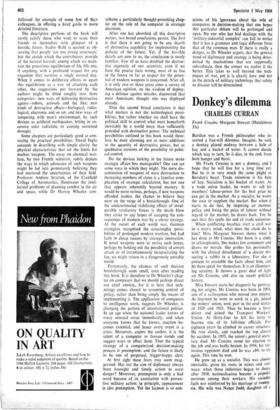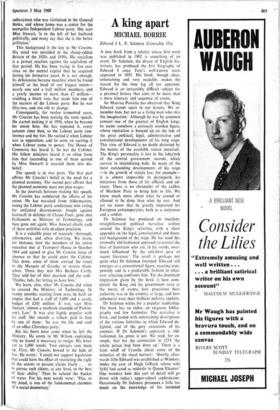Donkey's dilemma
CHARLES CURRAN
Buridan was a French philosopher who in- vented a free-will dilemma. Imagine, he said, a donkey placed midway between a bale of hay and a bucket of water. It cannot decide which way to turn. So it dies, in the end, from both hunger and thirst.
Mr Frank Cousins is not a donkey, and I hope that he will live for a long time yet. But he is in very much the same plight as Buridan's beast. Trade unionism is his bale of hay. Socialism is his bucket of water. As a trade union leader, he wants to sell his members' labour-power for the best price he can get in the market. As a socialist, he wants the state to supplant the market. But when it starts to do that, by imposing an incomes policy and fixing the price of labour without regard to the market, he draws back. For he sees that this spells the end of trade unionism.
When conflicting loyalties start a civil war in a man's mind, what does the clash do to him? Miss Margaret Stewart shows what it has done to Mr Cousins. Her book is a study in schizophrenia. She makes few comments and draws no morals. She probes his personality with the clinical detachment of a doctor dis- secting a rabbit in a laboratory. For she is content to assemble the facts about him, and let them speak for themselves. It is an illuminat- ing scrutiny. It throws a great deal of light on Mr Cousins, and also on recent political history.
Miss Stewart starts her diagnosis by portray- ing his origins. Mr Cousins was born in 1904, son of a railwayman who moved into mining. At fourteen he went to work in a pit, joined the miners' union, took part in the coal strikes of 1920 and 1921. Then he became a lorry driver and joined the Transport Workers' Union. At thirty-four he left his lorry to become one of its full-time officials. For eighteen years he climbed its career structure. He rose slowly, and reached the top almost by accident. In 1955, the union's,general'secre- tary died. Mr Cousins stood for election to the job anduwas badly beaten. In 1956, his vic- torious opponent died and he was able to try again. This time he won. He grew up ar a socialist. This was almost inevitable, given his roots in mines and rail- ways; when those industries began to decay after 19.18, nationalisation became a popular nostrum among their workers. His socialist faith was reinforced by his marriage at twanty- six. His wife was Nance Judd, daughter of a
railwayman who was victimised in the General Strike, and whose home was a centre for the evangelist Independent Labour party. She, says Miss Stewart, 'is to the left of her husband politically, and many say that she is the better politician.'
This background is the key to Mr Cousins. His mind was moulded in the slump-ridden Britain of the 1920s and 1930s. His socialism is a protest reaction against the capitalism of that period. He has been trying to live ever since on the mental capital that he acquired during his formative years. It is not enough. Its deficiencies became manifest when he found himself at the head of our biggest union— nearly one and a half million members, and a yearly income of more than £7 million— wielding a block vote that made him one of the masters of the Labour party. But he was fifty-two, and too old to change.
Consequently, for twelve tormented years, Mr Cousins has been making the same speech. He started making it in 1956, when he became his union boss. He. has repeated it, every autumn since then, to the Labour party con- ference and the TUC. He recited it when Labour was in opposition, and he- went on reciting it when ,Labour came to power. The House of Commons has heard it. So has the Cabinet. His fellow ministers heard it so .often from him that (according to one of them quoted by Miss Stewart) it wearied them into dis- belief.
The speech is in two parts. The first part affirms Mr Cousins's belief in the need for a planned economy. The second part affirms that the planned economy must not plan wages.
In the intervals between making this speech, Mr Cousins has conducted the affairs of his union. He has marched from Aldermaston; swung the Labour party conference into voting for unilateral disarmament; fought against Gaitskell in defence of Clause Four; gone into Parliament as Minister of Technology, and then gone out again. Miss Stewart charts each of these activities with deadpan precision.
It is a valuable piece of research—thorough, informative, and often diverting. We learn, for instance, how the members of his union executive met at Transport House in October 1964 and agreed to give Mr Cousins leave of absence so that he could enter the Cabinet. This done, some of them crossed the street to the Marquis of Granby to restore them- selves. There they met Mrs Barbara Castle. They told her of their decision and she said: 'Thanks, lads, for letting us have him.'
We learn, also, what Mr Cousins did when he created the Ministry of Technology. In twenty months, starting from zero, he built an empire that had a staff of 5,600 and a yearly budget of £244- million. It was, says Miss Stewart, 'almost a textbook example of Parkin- son's Law.' It was also highly popular with his staff. She records a tfibute paid to him by one of them: 'he was the life and soul of an office Christmas party.'
But his finest hour came when he left the Ministry. He wrote to Mr Wilson explaining why he found it necessary to resign. His letter ran to 1,000 words. Two extracts sum them up. First, Mr Cousins bowed to the bale of hay. He wrote: 'I could not support legislation that could have the effect of restricting the right of the unions to present claims freely . . or to pursue such claims, at any level, to the best of their ability.' Then he saluted the bucket of water. For his next words were: This; to my mind, is one of- the fundamental elements
of a Social democracy.' •







































 Previous page
Previous page